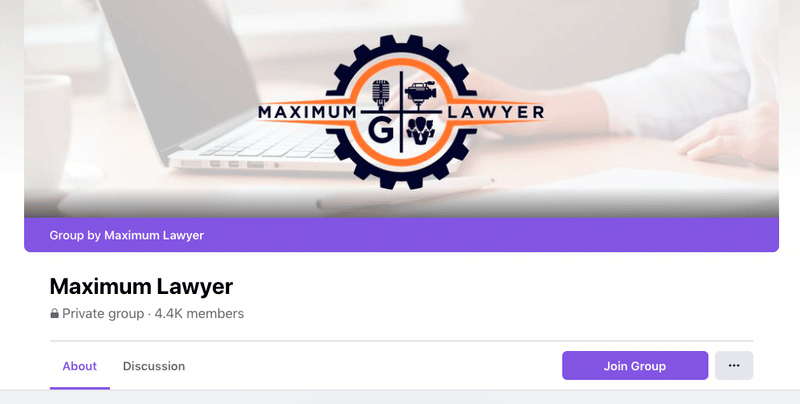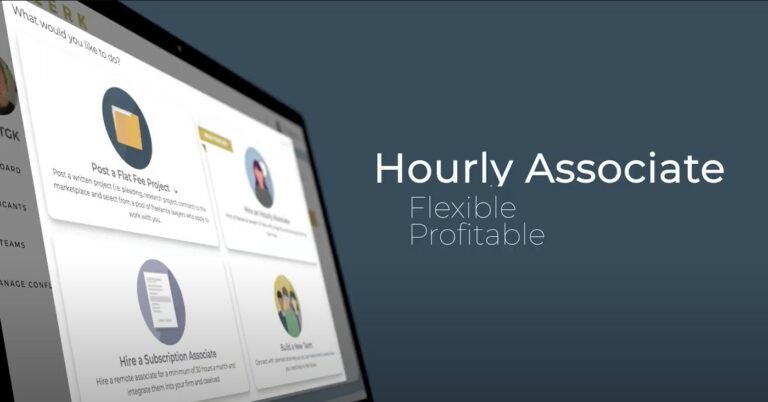There are many ways that lawyers can reduce stress, such as building breaks into the day, or embracing hobbies for some much-needed non-work activity. And those stress-management methods are important, in fact, we discuss a few below.
But the common thread between all of those management techniques is that they usually help you unwind the stress caused by all of the work you do, after the stress has built up.
What if you could just tackle the source of all that stress in the first place by reducing the amount of work you have to do or the crazy hours you have to put in to maintain your law practice?
In this article, we’re going to start by talking about how the best way to have less stress is to have less work. Then, we’ll cover a few of our favorite stress management techniques for those times when stress is somewhat unavoidable.
Note: At LAWCLERK, we help busy attorneys get an extra set of hands via our nationwide marketplace of over 3,600 incredibly talented freelance lawyers (aka virtual associates) with experience levels in almost every conceivable area of law. Learn more and sign up here.
Delegate Legal Work to Freelance Lawyers

The attorneys we speak to at LAWCLERK typically fall into two categories.
For one, we’ve talked to many lawyers whose law practices are overflowing with work to the point they have more work than they know what to do with.
Subsequently, their personal lives suffer — they’re often not sleeping enough, not making time to exercise, and not prioritizing other self-care activities.
That strain on work-life well-being can be sustainable for some period of time, but it’s not sustainable in the long-term. It can lead to burnout and unhappiness, which is a big factor in why many lawyers ultimately leave the profession. It can become too overwhelming to try to keep up with that intense workflow.
Conversely, we also hear from a lot of lawyers who are struggling to find enough work. This is very stressful for them, because they’ve often spent a lot of money to get their law degree, so now they are feeling the pressure and the burden of student loans that need to be repaid on top of other day-to-day living expenses.
LAWCLERK, our freelance lawyer marketplace, was founded because we wanted to solve both of those problems — for lawyers who are overwhelmed with too much work, and for lawyers who could really benefit from picking up extra work to supplement their income.
If you fall into the former group and are in need of an extra set of hands, we’ll discuss, below, how hiring a freelance lawyer can give you time back in the day and reduce your stress levels (among many other benefits).
Note: At LAWCLERK, we help connect busy attorneys, primarily solos and small firms, with our nationwide network of over 3,600 freelance lawyers. Our freelance lawyers are there to help you on a per-project basis, at the flat fee price you set. We also offer a Virtual Associate Subscription Program, which can be a great way to work with a dedicated virtual associate for your ongoing needs, rather than the occasional project. Learn more here.
An Example of How Delegating Legal Work to a Freelance Lawyer Gives You Time Back in Your Day
Say you need to write a motion for summary judgment for one of your clients. It’s been building for a few weeks, and it’s the right timing to file that motion. But you’re also busy with discovery deadlines, a trial schedule, and other hearings. And of course, there’s always the potential for new clients to call and want to meet with you as well.
To get that time-consuming motion for summary judgement written, you decide to hire a freelance lawyer. They may spend anywhere from 8 to 10 hours drafting that motion. And it takes an hour or two to review and edit the freelance lawyer’s work before you file it with the court.
You yourself would probably have needed about 8 to 10 hours to draft that motion, but with freelance help, you’re only investing around one to two hours.
By delegating the bulk of that substantive work, you’re saving yourself an entire workday in which you can do other things, such as preparing for the week’s court hearings or meeting with new clients. You can even reallocate that time for personal activities that can help further reduce your stress levels.
Examples of Great Times to Delegate
We see a lot of lawyers come to LAWCLERK to delegate work when they know they have life events coming up, which they want to be able to focus on and enjoy without worrying about particular projects getting done in their absence.
For example, in the summer, many lawyers rush to delegate work right before they leave for vacation with their family. Other times, we see lawyers delegating a lot of work right before they’re leaving for a week-long legal conference.
Lawyers can also turn to LAWCLERK when either they themselves or someone in their law firm is getting ready to have a child and go on leave, to help keep the workflow moving along.
Delegation can also become part of your daily routine, such as it has for Ayesha Mehdi. She regularly works with freelance lawyers on LAWCLERK to make her day much more efficient.
Ayesha started out as a solo attorney. After being fed up with feelings of burnout and realizing there must be a service out there to connect hiring attorneys with freelance attorneys, she found LAWCLERK on Google.
That was the answer she was looking for. After working with a few freelance lawyers who had produced excellent written work for her multiple times, she started using our Teams feature to regularly and easily send those specific team members work directly, without needing to post a Project and sift through applicants.
Stress Management Tips for When Stress Happens Anyway
Utilizing LAWCLERK to delegate your overflow work to a freelance attorney is going to be a huge step forward in reducing your own work-related stress.
Yet, regardless of how much we try to minimize stress at its source, there will still be days when stress crops up. Here are a few techniques and tips we recommend to further keep your stress under control.
Chase Your Daydreams
One of the greatest things about being a lawyer and having a law degree is that it opens the door to many different career options.
The most traditional path is to go work in a law firm, and that is a really wonderful career option for a lot of lawyers. But if you’re a lawyer working in a traditional firm setting and find yourself constantly daydreaming about doing something else with your legal career, go chase it!
Never underestimate yourself, the power of your law degree, your knowledge, and your training, to help make those dreams a reality.
For many lawyers, that includes charting their own freelance career. For whatever reason, they don’t want to manage their own clients, they don’t want to run a practice, but they want to work for themselves and work with a variety of other really interesting, talented lawyers.
For them, a career built entirely on freelancing is a fantastic option.
In fact, some of our most successful freelance lawyers have done just this and are very satisfied with their freelance career.
Some of them used to work for big law firms, for many years, but they grew tired of the pace, or of working for an inflexible or insensitive boss, and they dreamed of working for themselves on their own terms.
These freelance attorneys have built up their own freelance careers, and now they are living their ideal lifestyle, freelancing from anywhere in the world — something that wouldn’t be possible with a traditional firm.
Join Online Communities

If you’re not good at checking in on yourself and your own stress level, consider joining some online communities.
For instance, the Maximum Lawyer Facebook group has grown into a really powerful, supportive group of lawyers nationwide. There are also many other Facebook subgroups for attorneys, such as for lawyers who are also parents, or lawyers who love to hike.
Whatever interests you have outside of law, you’re sure to find a group somewhere of like-minded lawyers who want to help and support each other.
We also know of a lawyer who assigned their personal assistant the task of texting him every day at noon to check in on how he’s doing: what’s his mood, is he being productive, how’s the day going, etc.
This gives him a mindfulness check midday, every day. If he’s not on track at that point, he still has time to get focused and be productive.
Whether you find a group of like-minded lawyers to join online, or you have an assistant/coworker to check-in with, having a sense of community is critical for any attorney.
Embrace the Difficulty
There are going to be phases in your career that are harder and more stressful than others, whether you’re participating in tough trials or closing a huge deal for a very demanding client in a transactional case.
So sometimes, you just have to accept that’s part of what goes along with the legal career, and get through it. Know that it’s not going to last forever, and there are great, easier times ahead.
In the meantime, to help manage this expectation, allow yourself (or your team) to complain about things, because yes, things are tough.
For example, it can be a cathartic and helpful experience to have a regular roundup meeting in which participants can admit out loud to their team what it is that’s bothering them that day.
Everyone gets a chance to vent about a particularly frustrating project or situation, and then everyone collectively moves on from those vents. Think of this as similar to the meditation act of allowing negative thoughts to float away from you like leaves floating down the river, and then move on to more productive thoughts.
Embrace Hobbies

We’ve talked to many lawyers who have either chosen to or simply forced themselves to try to find a hobby during the pandemic, because they readily admit, “All I ever do is work,” or,“All I ever do is work and take care of my kids.”
For many, this is the first time in their careers they’ve tried to actively find a hobby.
For some, exercise has finally become a part of their day-to-day lives, and they feel healthier than ever. Others are finally making time to write the book that they’ve always dreamed of writing. Some have tried crafting, cross-stitch, artwork, woodworking — whatever they can find to forge a creative outlet for their stress.
For far too long, lawyers have joked about the fact that you don’t have time to have a hobby when you’re a lawyer, because your everything is that you’re a lawyer. But especially during the pandemic, a growing number of lawyers are choosing to find a real hobby, and that’s one very positive change we’ve seen come to the legal profession through the course of the pandemic — lawyers are finally making more time to play.
Hobbies don’t need to be some huge, expensive, time-consuming activity, such as international travel or classroom-style lessons.
Choose something simple to do in your own home, away from your workspace, and try to participate in a hobby that brings you joy on a day-to-day basis.
If nothing else, you can momentarily take your mind off of your stress.
Build Regular Breaks into Your Routine

Working hours on end without taking a break can be a recipe for burnout. Building breaks into your regular routine can actually result in some of your most productive days, while simultaneously reducing stress.
There is a lot of technology available to help with this. If you have a smartwatch or smart phone, you can use their built-in timer functions to remind you to get up and take a break, or to switch between kinds of tasks.
One particularly structured method of taking breaks is the Pomodoro Technique, named after the tomato-shaped kitchen timer. In this method, you set a timer for 25 minutes, then work uninterrupted until it goes off. When it does, give yourself a five-minute break.
After four cycles, take a much longer break, of 15-30 minutes. This ensures you take time to breathe, stretch, drink water, or whatever else you need to do on your breaks throughout the day.
Note: At LAWCLERK, we help busy attorneys get an extra set of hands via our nationwide marketplace of over 3,600 incredibly talented freelance lawyers (aka virtual associates) with experience levels in almost every conceivable area of law. Learn more and sign up here.



















